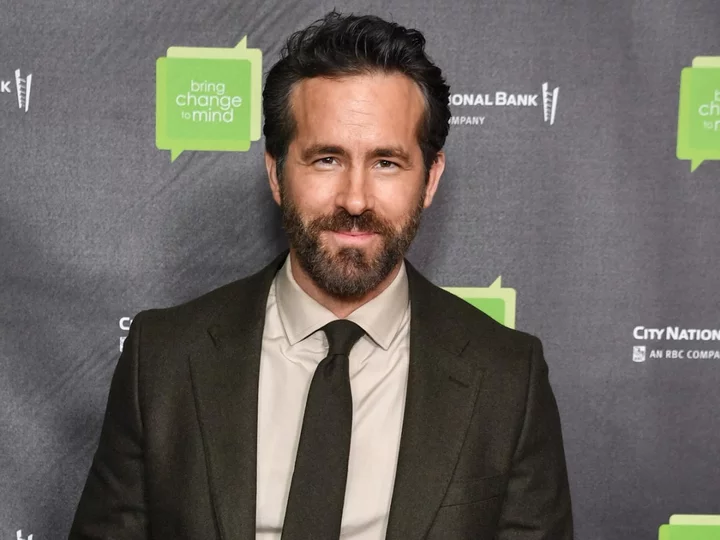
Ryan Reynolds opens up about how his mental health spins ‘out of control’
Ryan Reynolds has spoken candidly about his mental health, revealing that his mind can “spin out of control” sometimes. The actor, 46, spoke candidly about his mental health challenges during an interview with Page Six on 9 October, while attending non-profit organisation Bring Change to Mind’s annual Revels & Revelations Gala. Speaking to the outlet, he revealed that he’s found himself spinning “out of control” at times, before noting that he’s “not always great” at maintaining his mental equilibrium. However, Reynolds shared some routines that he follows when struggling with his mental health. “I certainly have my own little rituals and those kinds of things that help me stay grounded and keep my mind from spinning out of control,” he said. “Sometimes I’m really good at it, sometimes I’m not.” The Deadpool star noted that when he becomes aware of those “out of control” moments, he meditates in order to “take the time” for himself to regroup. He also shared how he’s become aware of his own lifestyle traits that he wants to work on amid his mental health struggles. “I tend to overbook myself when I’m spiraling that way,” he said. “I’m sort of aware of that stuff and I manage it as well as you can.” This isn’t the first time that Reynolds has spoken out about his mental health. He first opened up about his struggles with anxiety in February 2022 during an appearance on CBS’s Sunday Morning. “I’ve had anxiety my whole life really and you know, I feel like I have two parts of my personality. That one takes over when that happens,” he said. He also recalled how his feelings of anxiety would intensify before appearances on talk shows, such as Late Night With David Letterman. “I remember I’d be standing backstage before the curtain would open,” he said. “And I would think to myself: ‘I’m gonna die. I’m literally gonna die here. The curtain’s gonna open and I’m just gonna be a symphony of vomit.’ Just, like, something horrible’s gonna happen!” The Green Lantern star then noted that “as soon as that curtain opens” before he goes on stage, “this little guy takes over” that ultimately helps him manage his anxiety. “And he’s like: ‘I got this. You’re cool.’ I feel, like, my heart rate drop and my breathing calm, and I just sort of go out and I’m this different person. And I leave that interview going: ‘God, I’d love to be that guy!’” he said. During his appearance at Bring Change to Mind’s event on 11 October, Reynolds also discussed conversations that he and his wife, Blake Lively, have with their children about mental health. “I think it’s more about talking to them about everything,” he told People at the gala. “It’s genuine when I say I take a huge interest in their days and how things are going.” Reynolds and Lively, who’ve been married since 2012, share three daughters: James, eight, Inez, seven, and Betty, four. In February, they welcomed their fourth child, whose name hasn’t been publicly revealed. The Free Guy star also explained that the “best time” of his day is when he walks his children to and from school. When discussing some of the challenges that children often face, Reynolds praised his daughters for the self-awareness they’ve developed. “I think as parents, we are so much better equipped to handle the rigours of childhood through our kids now than when I was a kid. It’s just totally different now,” he said. “People are much more self-aware. And that’s the thing we sort of hang our hat on the most is self-awareness with our kids. Not be happy, not be anything, just be self-aware and welcome everything in.” Read More Ryan Reynolds describes experience attending Travis Kelce’s game with Taylor Swift From double dates to parenthood: A timeline of Blake Lively and Ryan Reynolds’ relationship NFL defends Taylor Swift coverage during games as Travis Kelce says they’re ‘overdoing it’ Ryan Reynolds describes experience attending Travis Kelce’s game with Taylor Swift Pokemon’s Detective Pikachu Returns and more top games of the week Travis Kelce reveals the two people who helped him woo Taylor Swift
1970-01-01 08:00

'There was no answer': US families search for missing from Israel attack
TEL AVIV U.S. citizens living in Israel urged U.S. President Joe Biden to do what he could to
1970-01-01 08:00

Finland investigates suspected sabotage of Baltic-connector gas pipeline
It is still unclear what caused a leak on the Baltic-connector, which is shared with Estonia.
1970-01-01 08:00

Braves could come to regret mocking Bryce Harper after Game 2
Atlanta Braves shortstop Orlando Arcia reportedly mocked Phillies star Bryce Harper for getting doubled off on Michael Harris II game-winning catch.
1970-01-01 08:00

A.J. Minter had the most savage response to Braves season-saving victory
Atlanta Braves relief pitcher A.J. Minter has the pulse of the fanbase, as he offered an incredible reaction to the team's season-saving victory.
1970-01-01 08:00

Israel-Hamas conflict: How to talk to teenagers about distressing news stories
With all the access teenagers today have to the internet and social media, they may see more distressing news stories than even their parents. Palestinian militant group Hamas – deemed a terrorist group by the UK Government – invaded Israel on Saturday from Gaza, with rocket attacks by air as well as military in boats. Since then, Israel has sealed the Hamas-ruled Gaza Strip off from food, fuel, medicine and other supplies, while launching retaliatory air strikes on the territory, which is home to 2.3 million people. The most recent numbers suggest 900 people have been killed in Israel, 700 in the Gaza territory and the West Bank, and many hostages have been taken. Hamas has pledged to kill captured Israeli hostages if attacks target civilians in Gaza. The conflict has sparked protests by pro-Palastine and pro-Israel groups in the UK and prompted political division on social media. Teenagers are likely to be exposed to a lot of the news, internet discussion and perhaps distressing images of conflict. So how should parents approach this? Talk about it at home Dr Jeri Tikare, clinical psychologist at Kooth, a digital mental health platform, believes parents should be as truthful as they can with their teenagers. “This means that it is important for us to not to hide things away from them. It is better for them to hear it from us (their people of safety) as opposed to reading it or hearing it from others,” he says. “Also bearing in mind the curious nature of the mind. It is inevitable that for things that they do not understand, they might research and look for answers. “It can be helpful if they get their information from a reliable source which can feel contained and reassuring. But share information at a level that is developmentally right and just enough to help the young person feel contained and safe.” Check yourself As the parent, learn the basics of what is going in the conflict yourself from reputable sources so you can have balanced, informed conversations with your child. “It can also be useful to be aware of our own reactions as parents or primary caregivers,” he says. “One of the ways young people learn and develop is via observing and then modelling adult behaviour. Hence, they can pick up anxieties or worries displayed by parents.” Validate and normalise expressing emotion If your teen is particularly affected by distressing news stories about war and conflict, Tikare encourages parents to give their teenagers the opportunity to express how they are feeling in different ways – such as writing, drawing, stories, songs, and things that feel helpful for the young person. “Some find a feelings box helpful,” he adds. “It might also be helpful to introduce them to some simple relaxation techniques such as taking three deep, slow breaths, breathing in for a count of three and out for three.” Be there for them Giving your teenager the space, time and encouragement to open up about how they feel on any subject – world news or otherwise – is key. “I know that life can be hard, busy and sometimes young people are aware of this and might not want to disturb you,” Tikare says. “Therefore, it might be helpful to make a conscious effort to let them know that you are mindful of how difficult it can be and reassure them that you are available to talk about things. “Giving them extra love and attention at this time can be helpful, especially at difficult times like this.” Discuss social media Tikare acknowledges that television, social media and other platforms “can be very distressing and exacerbating” for teenagers. But you may not be able to prise your child away from posting on their social media accounts altogether. “It would depend on the motivation behind posting and where they are posting,” Tikare says. “Posting about the feelings experienced around the conflict in a supportive and possibly moderated space, with people sharing similar feelings associated with the conflict, can help normalise the experience and leave them feeling less alone. “On the other hand, it could also expose them to content and comments that could potentially trigger distress.” So be sure to make them aware of the content they may come across online. Read More Autumn décor ideas for a seasonal refresh Why you shouldn’t tidy your garden too much in autumn World Mental Health Day: 5 ways to beat anxiety and change your life Alternative veg to grow for next season How to spot if your child is struggling with their mental health – and what to do next Does your pillowcase make a difference to your skin and hair health?
1970-01-01 08:00

World Mental Health Day: 5 ways to beat anxiety and change your life
Anxiety is something that touches most of us, to a greater or lesser extent. Although it may just be a temporary blip for some people, for many, anxiety is a diagnosed condition that blights their lives. Indeed, Mental Health UK estimates more than one in 10 people in the UK are living with an anxiety disorder – that’s over eight million of us. And World Mental Health Day (October 10) is a chance to address the topic, agrees clinical psychologist Dr Kirren Schnack – author of the new book Ten Times Calmer: Beat Anxiety And Change Your Life. “It’s a reminder that mental wellbeing is just as important as physical health,” she says, pointing out that anxiety disorders are among the most widespread mental health issues globally. “Clinically, I’ve seen more and more people coming in with anxiety issue. The pandemic has played a significant role in this surge, introducing unprecedented levels of uncertainty, fear, and social isolation. At the same time, global economic instability and job losses have intensified stress and anxiety for many,” Schnack adds. “The widespread use of digital technology and social media has exposed people to a constant stream of alarming news and comparison-driven content that also feeds anxiety.” Schnack explains that anxiety disorders include generalised anxiety disorder (GAD), which causes chronic worry and hinders decision-making; health anxiety, where there’s an excessive preoccupation with diseases and illness; panic disorder, which is marked by sudden overwhelming panic attacks; and social anxiety, which leads to avoidance, isolation and low confidence. “They can blight daily life through physical symptoms, cognitive impairment, social isolation, disrupted routines, and emotional distress,” she says. Schnack suggests these five ways to combat anxiety problems and find calm… 1. Calm your stressed nervous system Anxiety places significant strain on the nervous system, Schnack explains, but there are simple daily practices that can help alleviate this stress. One is focusing on breathing, extending your exhale longer than your inhale. To do this, Schnack says you need to inhale gently through your nose, pause for a few seconds, then exhale slowly and deeply, ensuring an extended exhale. “A longer exhale helps by increasing the activation of the body’s parasympathetic nervous system, which counteracts stress hormones, lowers heart rate, and reduces overall physiological stress,” she says. She suggests around three to five of the breaths are repeated on multiple occasions throughout the day, and stresses that consistency is key. “Recognise that if anxiety has been a longstanding presence, it will take time and patience to restore your nervous system’s sense of safety and stability.” 2. Address anxious thoughts Schnack explains that anxiety often generates anxious thoughts that can seem like undeniable facts that are often dwelled on and reacted to, thus intensifying anxiety. “To break free from this cycle, it’s crucial to consciously confront and process these anxious thoughts,” she says. To do this, write a simple record, noting the date of your anxious prediction, describing what it was, and then, after a specified time like a day or two, return to what you’ve written and confirm whether the prediction was accurate by marking it as ‘yes’ or ‘no’. When the prediction doesn’t materialise, make a note of the actual outcome. Revisit the record, especially during anxious moments, and count the yes or no entries to reflect on your progress. “This practice trains your mind to adopt a broader, less anxious perspective,” explains Schnack. 3. Stop over-focusing on anxiety“People struggling with anxiety often find it challenging to shift their attention away from anxiety symptoms, leading to a persistent preoccupation that can worsen their problems,” says Schnack, who explains that this preoccupation can lead to excessive self-analysis, fixation on physical sensations or repetitive thoughts, and being hypervigilant. To shift your attention away from overwhelming anxiety, Schnack suggests trying this exercise: choose a colour, such as blue, and actively seek out blue objects in your surroundings. Name them out loud, and count them as you move around, possibly describing the item too. “Strive to maintain this focus for a few minutes, switching to different colours if necessary. Again, consistency is crucial, so make an effort to practice this regularly whenever anxiety hijacks your attention,” she advises. 4. Learn to tolerate uncertainty Recognising and addressing uncertainty is vital when dealing with anxiety, Schnack stresses. “You can’t resolve every uncertainty in life – the key lies in enhancing your ability to tolerate uncertainty so you can reduce your anxiety,” she explains. “Being more accepting of the fact that things may not always go as planned or that the future is uncertain can be incredibly liberating.” To help build resilience against uncertainty, Schnack advises people to take a moment to slow down and not immediately engage in reactive behaviour demanded by uncertainty, such as checking, Googling or avoiding things. Instead, she says, note your feelings, observing what uncertainty is doing to your mind and body, and write out an affirmation such as: ‘I’m feeling anxious because I’m uncertain about… My typical response to uncertainty is to engage in… behaviour. I recognise this only worsens my anxiety. My goal is to distance myself from anxiety rather than gravitate towards it. I can sit with the feeling of uncertainty for as long as I can, and build on this time until I get better and better at it.’ 5. Gradually face your fearsConfronting your fears is an effective way to overcome them, observes Schnack, although this can often feel overwhelming. “When you confront your fears, you’re essentially acting in opposition to your anxious thoughts and what anxiety is telling you. This process weakens anxiety’s grip on you, and when the actual outcomes don’t align with your anxious predictions, your mind can naturally adjust its thinking.” She suggests starting with small steps and gradually building up. So, for social anxiety, gradually start by saying a simple sentence or asking a basic closed question, and gradually building up from there. For health anxiety, gradually reduce and eliminate excessive online researching about illness and diseases, starting with small-time durations and then building on that. For panic disorder, gradually spend more time in places you typically avoid, starting with short durations like 30 seconds, then a few minutes, and gradually keep increasing the time. “Remember to repeatedly face your fears to make meaningful progress – it’s not just a one time thing,” adds Schnack. Ten Times Calmer: Beat Anxiety And Change Your Life by Dr Kirren Schnack is published by Bluebird, priced £16.99. Available now. Read More Alternative veg to grow for next season How to spot if your child is struggling with their mental health – and what to do next Does your pillowcase make a difference to your skin and hair health? Sarah Jessica Parker channels Carrie Bradshaw on the red carpet in mismatched shoes Does your pillowcase make a difference to your skin and hair health? As transphobic hate crimes rise by 11% in a year, how to be a better ally
1970-01-01 08:00

Nick Castellanos has perfect Philly mentality after gut-wrenching loss
Nick Castellanos isn't stressing the Philadelphia Phillies' Game 2 loss to the Atlanta Braves.
1970-01-01 08:00

How Austin Riley outsmarted Bryce Harper on Braves final out
Braves star Austin Riley can do it all. After hitting Game 2's go-ahead homer, he completed a wild double-play to end the game.
1970-01-01 08:00

First pitch: 3 things I heard from the Atlanta Braves on Tuesday around NLDS Game 2
The Atlanta Braves grabbed back the momentum from the Philadelphia Phillies, and here's what some of the Braves were saying after a big win.
1970-01-01 08:00

3 Phillies to blame for blowing it big time in Game 2 vs. Braves
The Philadelphia Phillies took a lead into the eighth inning of NLDS Game 2. Who is to blame for giving away what would have been a commanding series lead?
1970-01-01 08:00

Insane angle of Austin Riley’s game-winning homer shows Braves fans losing their minds
The Comeback Kids are back. The Braves beat the Phillies in Game 2 of the NLDS off of an Austin Riley game-winning homer.
1970-01-01 08:00
